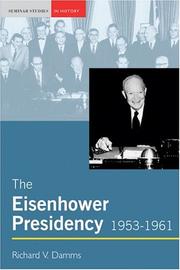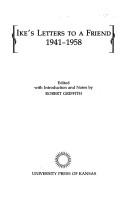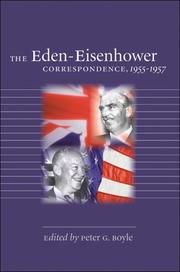| Listing 1 - 10 of 38 | << page >> |
Sort by
|
Book
Year: 2017 Publisher: Washington : Great Neck Publishing,
Abstract | Keywords | Export | Availability | Bookmark
 Loading...
Loading...Choose an application
- Reference Manager
- EndNote
- RefWorks (Direct export to RefWorks)
Presents the text of the author's 1961 State of the Union address as president of the United States. Direction of foreign policy; State of national defense; Position of the economy; Improvement in the levels of American agricultural and manufactured goods; Comments on the National Defense Education Act of 1958; Other statements.
Book
ISBN: 1315842386 1317888707 9781317888710 1317888715 9781315842387 9780582287204 9781317888697 9781317888703 9781138161092 Year: 2014 Publisher: London
Abstract | Keywords | Export | Availability | Bookmark
 Loading...
Loading...Choose an application
- Reference Manager
- EndNote
- RefWorks (Direct export to RefWorks)
Presidents --- Eisenhower, Dwight D. --- Ai-sen-hao, --- Ėĭzenkhauėr, Duaĭt, --- Eisenhower, Ike, --- Ai-sen-hao-wei-erh, --- Ayzinhāvir, Duvāyt, --- ايزنهاور، دوايت --- United States --- Politics and government --- Foreign relations --- Eisenhower, Dwight David,

ISBN: 1317879201 1315839210 1317879198 9781317879190 0582368189 9780582368187 9781317879206 9781315839219 9781317879183 9781138166318 Year: 2002 Publisher: London Longman
Abstract | Keywords | Export | Availability | Bookmark
 Loading...
Loading...Choose an application
- Reference Manager
- EndNote
- RefWorks (Direct export to RefWorks)
Eisenhower, Dwight D. --- Ai-sen-hao, --- Ėĭzenkhauėr, Duaĭt, --- Eisenhower, Ike, --- Ai-sen-hao-wei-erh, --- Ayzinhāvir, Duvāyt, --- ايزنهاور، دوايت --- United States --- History --- Eisenhower, Dwight David,

ISBN: 0700630945 0700602577 0700631526 Year: 1984 Publisher: University Press of Kansas
Abstract | Keywords | Export | Availability | Bookmark
 Loading...
Loading...Choose an application
- Reference Manager
- EndNote
- RefWorks (Direct export to RefWorks)
“Swede Hazlett was one of the people to whom I ‘opened up.’”—Dwight D. EisenhowerDwight D. Eisenhower and E. E. (“Swede”) Hazlett grew up together in Abilene, Kansas, and remained close, corresponding regularly from 1941 until Hazlett’s death in 1958. The letters collected in this volume, many of them surprisingly revealing, contain Eisenhower’s views on a wide range of diplomatic, military, and political issues. Taken together they constitute a remarkable inner history of Eisenhower’s public career.Robert Griffith’s introductory essay is a masterful account of the EisenhowerHazlett relationship and of the insights provided by their correspondence for understanding the Eisenhower years. Griffith’s substantial headnotes give additional detail and context where necessary and provide a sense of narrative continuity to the correspondence.The Eisenhower who emerges from these pages bears little resemblance to the bumbling caricature produced by journalists in the 1950s. But neither does he fit the role assigned to him by so many people today, whether liberal critics of the Cold War, conservative opponents of Democratic fiscal policy, or White House aides attempting to “Eisenhowerize” Ronald Reagan. He is, rather, a complex and multidimensional historical figure whom we must study, on his own terms, if we are to fully understand our recent past.
Eisenhower, Dwight D. --- Hazlett, Everett E., --- Ai-sen-hao, --- Ėĭzenkhauėr, Duaĭt, --- Eisenhower, Ike, --- Ai-sen-hao-wei-erh, --- Ayzinhāvir, Duvāyt, --- ايزنهاور، دوايت --- Hazlett, Edward Everett, --- Hazlett, Swede, --- Biography: historical, political & military --- Eisenhower, Dwight David,
Book
ISBN: 1421435721 1421435748 142143573X Year: 2019 Publisher: Johns Hopkins University Press
Abstract | Keywords | Export | Availability | Bookmark
 Loading...
Loading...Choose an application
- Reference Manager
- EndNote
- RefWorks (Direct export to RefWorks)
This book outlines the transition of U.S. foreign policy during the Eisenhower administration. In the years leading up to Eisenhower's election, America's predominant foreign economic program was based on the concept of "trade not aid," which deemphasized foreign aid and relied instead on liberalized world trade and the encouragement of private foreign investment to assure world economic growth. When Eisenhower took office in 1953, he embraced this doctrine. However, as problems in the Third World worsened, it became clear to Eisenhower and other architects of American foreign policy that trade and private investment were insufficient solutions to the economic woes of developing nations. In 1954 Eisenhower began to embrace economic aid as a core axis of his foreign economic policy. Burton I. Kaufman contextualizes Eisenhower's foreign policy leadership in the ongoing historical evaluation of Eisenhower's leadership prowess. He evaluates the outcomes of the Eisenhower administration's trade and aid program, arguing that developing countries were worse off by the time Eisenhower left office.
Eisenhower, Dwight D. --- United States --- Foreign economic relations. --- History of the Americas
Book
Year: 2017 Publisher: [Place of publication not identified] : Great Neck Publishing,
Abstract | Keywords | Export | Availability | Bookmark
 Loading...
Loading...Choose an application
- Reference Manager
- EndNote
- RefWorks (Direct export to RefWorks)
Military bases, American. --- Eisenhower, Dwight D. --- United States --- Armed Forces --- Foreign service.
Book
ISBN: 1282479229 9786612479229 0739142275 9780739142271 9780739142257 0739142259 9780739142257 9781282479227 6612479221 Year: 2010 Publisher: Lanham, Md. Lexington Books
Abstract | Keywords | Export | Availability | Bookmark
 Loading...
Loading...Choose an application
- Reference Manager
- EndNote
- RefWorks (Direct export to RefWorks)
This book addresses the US-West German alliance in the 1950s, during which time Dwight Eisenhower was in the White House and Konrad Adenauer in the Federal Chancery. This is a unique multi-lateral, multi-archival work that analyzes the dilemmas and ultimate successes of the Cold War alliance that was most crucial for Western Europe during the early years of the Cold War.
Cold War --- Diplomatic history. --- Eisenhower, Dwight D. --- Adenauer, Konrad, --- United States --- Germany (West) --- Foreign relations
Book
ISBN: 1498522211 9781498522212 9781498522212 9781498522229 149852222X 9781498522205 Year: 2015 Publisher: Lanham, Maryland
Abstract | Keywords | Export | Availability | Bookmark
 Loading...
Loading...Choose an application
- Reference Manager
- EndNote
- RefWorks (Direct export to RefWorks)
This book offers candid assessments of the Eisenhower presidency and lessons we can apply in examining presidents today. The contributors, including many noted Eisenhower and presidency scholars, consider Eisenhower's leadership style, strategic vision, approach to civil rights and the economy, reactions to crises at home and abroad, and more.
Political leadership --- History. --- Eisenhower, Dwight D. --- 1953-1961 --- United States --- United States --- United States. --- Politics and government --- Politics and government.
Book
ISBN: 9780801451508 9780801467929 0801467926 0801467934 9780801467936 0801451507 Year: 2013 Publisher: Ithaca : Cornell University Press,
Abstract | Keywords | Export | Availability | Bookmark
 Loading...
Loading...Choose an application
- Reference Manager
- EndNote
- RefWorks (Direct export to RefWorks)
In a critical Cold War moment, Dwight D. Eisenhower's presidency suddenly changed when the Soviet Union launched Sputnik, the world's first satellite. What Ike called "a small ball" became a source of Russian pride and propaganda, and it wounded him politically, as critics charged that he responded sluggishly to the challenge of space exploration. Yet Eisenhower refused to panic after Sputnik-and he did more than just stay calm. He helped to guide the United States into the Space Age, even though Americans have given greater credit to John F. Kennedy for that achievement.In Eisenhower's Sputnik Moment, Yanek Mieczkowski examines the early history of America's space program, reassessing Eisenhower's leadership. He details how Eisenhower approved breakthrough satellites, supported a new civilian space agency, signed a landmark science education law, and fostered improved relations with scientists. These feats made Eisenhower's post-Sputnik years not the flop that critics alleged but a time of remarkable progress, even as he endured the setbacks of recession, medical illness, and a humiliating first U.S. attempt to launch a satellite. Eisenhower's principled stands enabled him to resist intense pressure to boost federal spending, and he instead pursued his priorities-a balanced budget, prosperous economy, and sturdy national defense. Yet Sputnik also altered the world's power dynamics, sweeping Eisenhower in directions that were new, even alien, to him, and he misjudged the importance of space in the Cold War's "prestige race." By contrast, Kennedy capitalized on the issue in the 1960 election, and after taking office he urged a manned mission to the moon, leaving Eisenhower to grumble over the young president's aggressive approach.Offering a fast-paced account of this Cold War episode, Mieczkowski demonstrates that Eisenhower built an impressive record in space and on earth, all the while offering warnings about America's stature and strengths that still hold true today.
Artificial satellites, Russian --- Sputnik satellites --- Astronautics and state --- Political aspects --- History. --- Eisenhower, Dwight D. --- United States --- Politics and government

ISBN: 0807876305 9780807876305 0807829358 9780807829356 9798890870674 Year: 2005 Publisher: Chapel Hill, N.C. University of North Carolina Press
Abstract | Keywords | Export | Availability | Bookmark
 Loading...
Loading...Choose an application
- Reference Manager
- EndNote
- RefWorks (Direct export to RefWorks)
The personal correspondence between President Dwight D. Eisenhower and Prime Minister Anthony Eden during the time they were simultaneously in office tells the dramatic story of a relationship that began with great promise but ended in division and estrangement. Many of the letters have only recently been declassified, making it possible for the first time to publish this unique historic collection in its entirety.Peter G. Boyle's introduction, annotations, and conclusion provide context for the letters--details about the personalities and careers of Eden and Eisenhower and major issue
Prime ministers --- Presidents --- Eden, Anthony, --- Eisenhower, Dwight D. --- Ai-sen-hao, --- Ėĭzenkhauėr, Duaĭt, --- Eisenhower, Ike, --- Ai-sen-hao-wei-erh, --- Ayzinhāvir, Duvāyt, --- ايزنهاور، دوايت --- Avon, Anthony Eden, --- Eden, Robert Anthony, --- Iden, Antoni, --- Great Britain --- United States --- Foreign relations --- Eden, Anthony --- Eisenhower, Dwight David,
| Listing 1 - 10 of 38 | << page >> |
Sort by
|

 Search
Search Feedback
Feedback About UniCat
About UniCat  Help
Help News
News